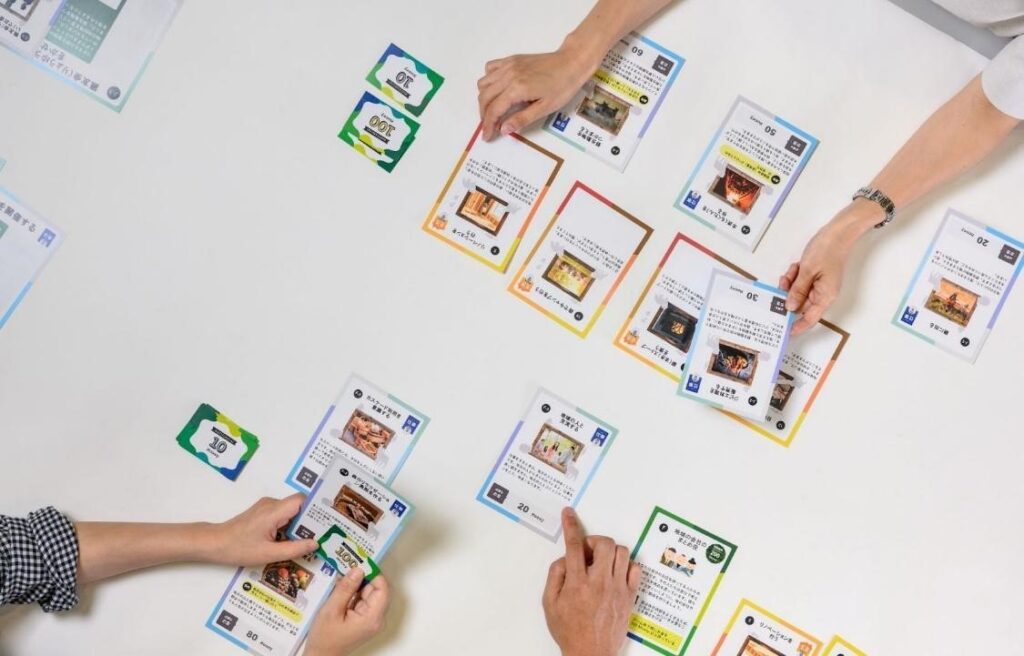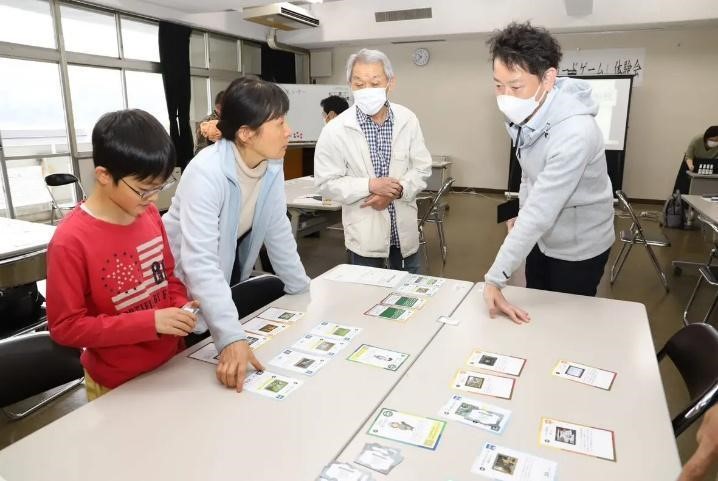Updated by "Forest Circular Economy" Editorial Board on April 25, 2025, 4:23 PM JST
Editorial Board, Forest Circular Economy
Forestcircularity-editor
We aim to realize "Vision 2050: Japan Shines, Forest Circular Economy" promoted by the Platinum Forest Industry Initiative. We will disseminate ideas and initiatives to promote biomass chemistry, realize woody and lumbery communities, and encourage innovation in the forestry industry in order to fully utilize forest resources to decarbonize the economy, strengthen economic security, and create local communities.
moritomirai," a card game jointly developed by Yamanashi Nichinichi Shimbun and Project Design, is attracting attention as a teaching tool for promoting a new type of "forest and tree education. This unique tool for thinking about the "future of forests" is being used in a variety of settings, from school education to corporate training.
moritomirai is a simulation-type card game that allows players to experience how their actions will change the town and forest 20 years from now. Participants are assigned to 10 different occupations, such as "mountain owner," "government official," "hunter," "house builder," and "school teacher," and each person acts while aiming for different goals.
As the game progresses by selecting cards for "Work," "Life," "Money," etc., four meters that indicate the status of the forest -- "Love for the forest," "Care and management," "Maintenance forest (amount of resources)," and "Management ability of forestry" -- change. --The game is played in a way that is both fun and challenging. If each player acts only in his or her own interest, the condition of the forest will gradually deteriorate. The game is designed to provide an experiential understanding of the complexity and interdependence of forest management.

In the absence of a single correct answer, the participants themselves will consider how to balance sometimes conflicting factors such as economic and environmental values, short-term profit and long-term sustainability, and the process of working together to achieve a better "forest future" through dialogue with other players will itself be a learning experience. The process of working together to achieve a better "forest future" is a learning experience.
A major feature of this program is that participants can learn the complexity and depth of nature and forest management and the importance of collaborating with others through immersion in games. Unlike conventional classroom-based education, the element of "play" draws out the participants' initiative and is expected to lower the psychological hurdle to difficult topics.
This card game is used in schools across Japan as part of SDG studies and forest schools, providing a valuable opportunity for children to gain a hands-on understanding of the multifaceted functions of forests and their connection to society.

It has also been introduced by companies and local governments as a communication tool in training new recruits and team building, or as a training program to raise environmental awareness throughout the organization. Participants with various values face a common goal through the game, which deepens mutual understanding and creates an opportunity for constructive dialogue.
Furthermore, it is effective as a practical tool for specific environmental education and awareness activities in the local community, such as workshops for citizens, and can function as a place to simulate consensus building among diverse stakeholders.
The learning provided by moritomirai is not limited to the acquisition of fragmented knowledge about forests. Through the game process, participants realize how deeply connected forests are to their own lives and begin to think about what they need to do to continue enjoying the bounty of forests into the future. The game is highly regarded as a practical teaching material for "forest education" and "tree education," both of which have been the focus of attention in recent years, and it is a system that enables participants to face the question of how to pass on natural resources to future generations while playing.
The unique feature of this educational material is that it not only provides knowledge, but also generates real learning such as "consensus building" and "understanding of conflicts" among the participants. Unlike materials that merely convey information, the game format fosters a sense of ownership and encourages participants to confront forest issues as "their own business.
Cooperation and negotiation with others experienced in the game will allow players to learn the importance of communication and collaboration in the real world. Above all, the most important learning effect is that the game allows students to gain an essential perspective on the need to establish a sound cycle between economic activities and forest resource conservation in order to realize sustainable forest management, taking into account economic rationality.